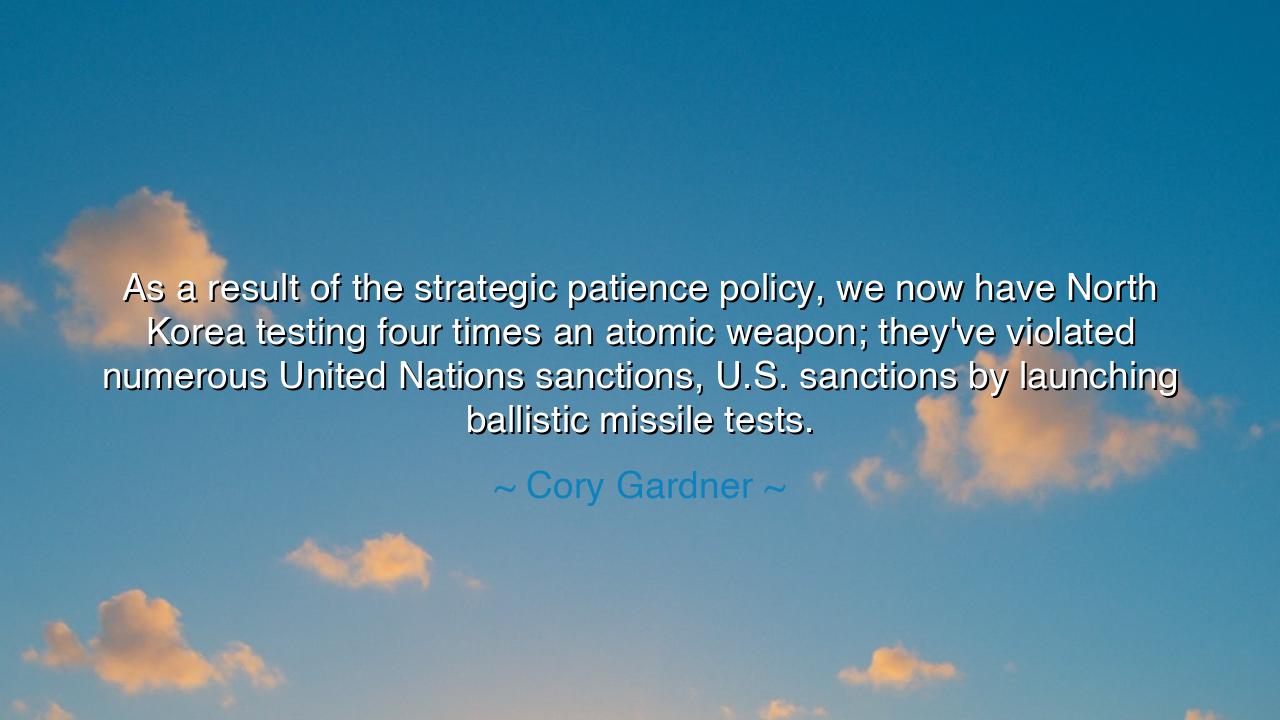
As a result of the strategic patience policy, we now have North
As a result of the strategic patience policy, we now have North Korea testing four times an atomic weapon; they've violated numerous United Nations sanctions, U.S. sanctions by launching ballistic missile tests.






Cory Gardner, speaking with the weight of a statesman, once declared: “As a result of the strategic patience policy, we now have North Korea testing four times an atomic weapon; they’ve violated numerous United Nations sanctions, U.S. sanctions by launching ballistic missile tests.” These words are not mere commentary on politics—they are a warning, a reminder that patience without purpose can become weakness, and delay without action can turn into peril. His words echo through the corridors of history, teaching us that there are moments when waiting becomes dangerous, and when action, though costly, is the only shield against calamity.
The ancients taught that patience is a virtue, but even virtue can rot when misapplied. Strategic patience was meant as a shield—a policy of watchfulness, of waiting for change, of hoping that time itself would soften the ambitions of North Korea. Yet Gardner reminds us that time, left unwatched, can become the ally of those who would defy peace. While leaders chose to wait, the hammer of destiny was forged in hidden workshops: nuclear fire was tested, and ballistic missiles reached toward the heavens. This is the danger of patience turned to inaction, of strategy divorced from courage.
History itself bears witness to this truth. Recall the tale of Neville Chamberlain and the policy of appeasement toward Nazi Germany. In the late 1930s, Europe chose patience over confrontation, delay over discipline, silence over resistance. They waited, hoping that the fire of Hitler’s ambition might burn itself out. Yet in that waiting, the flames only grew, until they engulfed a continent. Chamberlain returned from Munich declaring “peace in our time,” yet war soon followed, more terrible than any had imagined. The lesson is the same: patience without resolve becomes an invitation to aggression.
Gardner’s words, then, are not aimed only at North Korea—they are aimed at the hearts of leaders and citizens alike. They warn us that when sanctions are broken, when treaties are mocked, and when the world stands silent, the violator grows bold. For every missile launched, every atomic test conducted, is not just an act of defiance—it is the proclamation of a truth: that silence and delay can embolden those who would challenge order itself.
Yet let us not despise patience altogether. For patience, when joined with strength, is a mighty force. To wait while preparing, to endure while strengthening, to watch while readying the sword—that is true strategic patience. But to wait without readiness, to hope without action, is like standing by while a flood gathers, believing the waters will turn back on their own. Gardner’s warning is that patience must be paired with vigilance, and strategy must be paired with resolve.
The lesson for us, dear listener, is this: in life as in politics, do not confuse waiting with wisdom. If you wait, let it be with purpose. If you pause, let it be to gather strength, not to drift into slumber. Whether in matters of nations or matters of the heart, recognize when patience serves you, and when it betrays you. Delay, when wrongly chosen, can create greater storms than any action might have caused.
Thus, hear Gardner’s words as more than politics—they are a mirror for all humanity. If there is a challenge in your life, do not let false patience blind you. Act when action is required. Speak when silence endangers truth. Strengthen your defenses while you wait, so that your patience is not weakness but readiness. For the world, like the soul, demands both wisdom and courage—and only when both are joined can peace be secured.
And so, let the teaching stand: patience is holy, but it is not eternal. There are times when the fire must be faced, the hand must be raised, the will must be declared. For to wait too long is to surrender without a fight. Strategic patience without strategic action is but a hollow shell, and hollow shells cannot protect against the fire of the storm.






AAdministratorAdministrator
Welcome, honored guests. Please leave a comment, we will respond soon